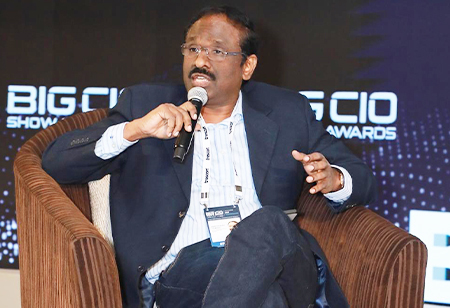
A Technology Leader's Handbook to Formulating Agile Digital Transformation Strategies


Srinivasulu Thayam, CTO, AUROiTECH - Aravind Eye Care System, 0
According to you, what is the ideal leadership approach towards developing an agile digital transformation strategy?
With the ongoing digital transformation phenomenon transforming the way most industries operate in recent times, it is paramount for every organization to remain agile across almost every function. Thus, every business leader must ensure that their leadership approach is in sync with the organization's vision in terms of enhancing operational efficiency, building product portfolio, developing talent, and many other aspects. Also, leaders must cultivate a habit of continuous innovation, wherein they must fail fast, continue developing proof of concepts (POC), and focus on further developing the ecosystem by leveraging the innovative thinking ability of the team members.
Additionally, since many employees are averse to change and do not want to come out of their comfort zones, a leader must strive to bring in a change in the mindset of the employees by making them understand the importance of being open to change and the value-addition that it provides to both their professional career as well as the company as a whole. Most importantly, every company must make sure that its workforce possesses the necessary skill sets to traverse the modern-day business landscape. This can either be done through hiring new talent as per the latest skill requirements or training & upskilling the existing manpower with those skill sets.
Suggest a few effective strategies for organizations to build high-performing organizations.
Over the course of my 25+ years-long career in India and abroad, I've realized that the foremost step for every business leader towards building high-performing teams is to constantly create benchmarks for themselves and regularly revise the organizational goals. Adding on, leaders must devise their organization's vision and mission statements in such a way that the overall
performance of the company is better than that of the previous year. However, it is extremely critical for organizations to have well-defined metrics or KPIs in place to assess the present performance and accordingly come up with objectives for the future. Also, most organization leaders prioritize the final returns rather than focusing on improving initial processes such as having a well-defined vision & mission, building an efficient ecosystem of stakeholders, developing talent and many others. Having a change in this approach and concentrating on having the right kind of processes and tools in place will go a long way in building high-performance teams.
Briefly explain the importance of staying updated with the latest technologies and industry trends for today's tech leaders.
Given the rapid pace at which technology is advancing lately, staying abreast with the latest technologies and industry dynamics is more an option than a norm, especially for technology leaders. While there are many ways to do so, I believe every tech leader must be a keen observer and carry the mindset of continuous learning. Also, networking with other experts within the technology ecosystem by regularly attending conferences, seminars, workshops and other events not only helps you stay aligned with the latest market dynamics but also enhances your knowledge and technology prowess, which will be instrumental in formulating effective business strategies for your organization. Additionally, this also helps the technology leaders to inspire their team members to upgrade their technology skills and stay relevant in today's ever-evolving tech landscape.
How can business leaders create a conducive workplace environment in line with the expectations of today's Gen Z workforce?
Today's Gen-Z millennials have an entirely different idea of what an ideal workplace must be like as compared to previous generations. They prefer a flat organizational culture and demand recognition and value for their contributions to the company. Thus, it is imperative for every business leader to be flexible in their approach at the workplace and develop capabilities to be able to work without any hassles with this new generation workforce. In simple terms, every leader must adopt the 'Contextual Leadership' approach at the workplace, wherein he/she must adapt strategies and everyday practices as per the current mindset, expectations and demands of the Gen-Z workforce.
Briefly explain the importance of staying updated with the latest technologies and industry trends for today's tech leaders.
Given the rapid pace at which technology is advancing lately, staying abreast with the latest technologies and industry dynamics is more an option than a norm, especially for technology leaders. While there are many ways to do so, I believe every tech leader must be a keen observer and carry the mindset of continuous learning. Also, networking with other experts within the technology ecosystem by regularly attending conferences, seminars, workshops and other events not only helps you stay aligned with the latest market dynamics but also enhances your knowledge and technology prowess, which will be instrumental in formulating effective business strategies for your organization. Additionally, this also helps the technology leaders to inspire their team members to upgrade their technology skills and stay relevant in today's ever-evolving tech landscape.
It is extremely critical for organizations to have well-defined metrics or KPIs in place to assess the present performance and accordingly come up with objectives for the future.
How can business leaders create a conducive workplace environment in line with the expectations of today's Gen Z workforce?
Today's Gen-Z millennials have an entirely different idea of what an ideal workplace must be like as compared to previous generations. They prefer a flat organizational culture and demand recognition and value for their contributions to the company. Thus, it is imperative for every business leader to be flexible in their approach at the workplace and develop capabilities to be able to work without any hassles with this new generation workforce. In simple terms, every leader must adopt the 'Contextual Leadership' approach at the workplace, wherein he/she must adapt strategies and everyday practices as per the current mindset, expectations and demands of the Gen-Z workforce.